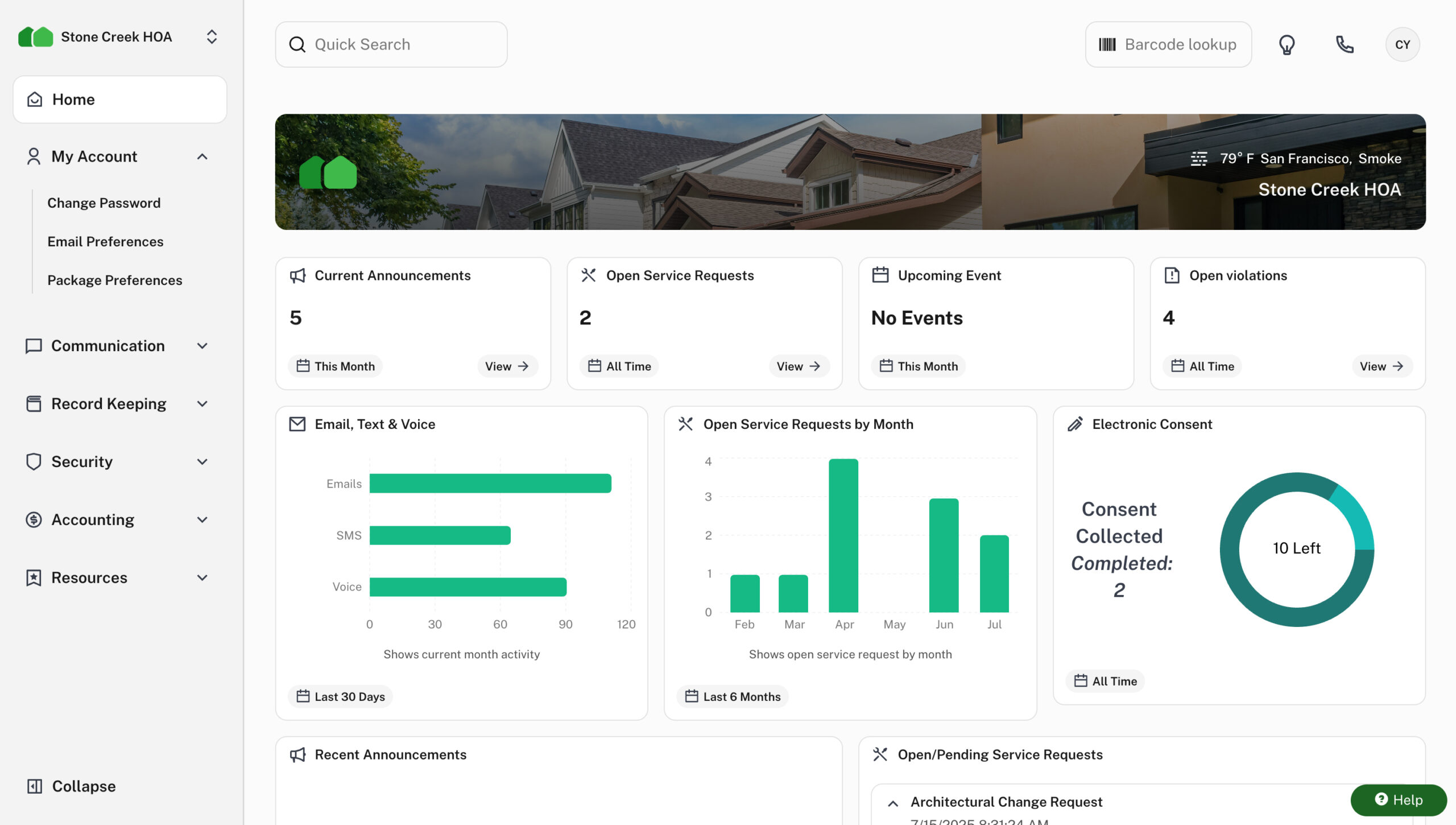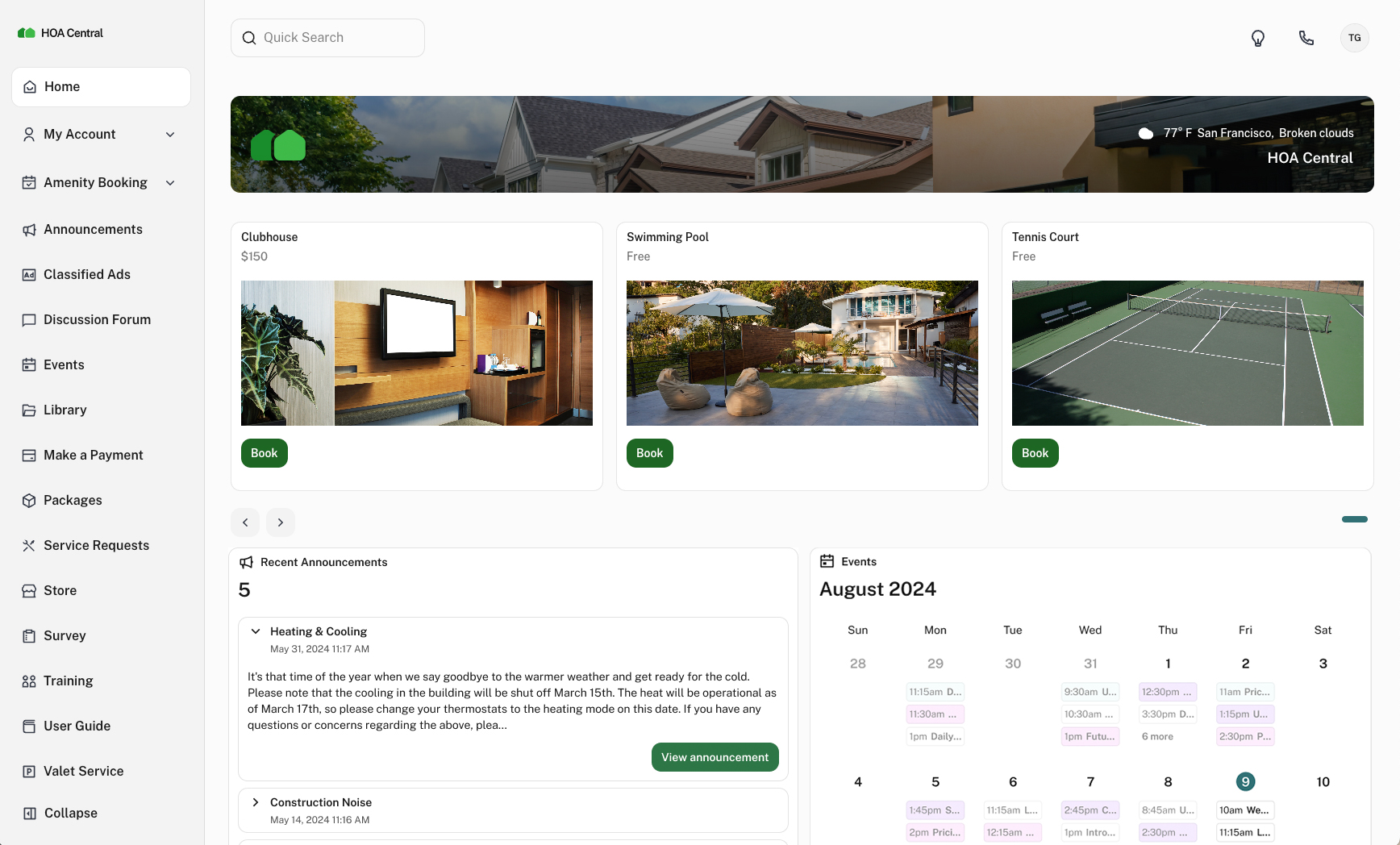Best practices for hiring an HOA attorney

Your homeowners association needs an HOA attorney. There are several reasons why this is true, but one of the most compelling explanations is that attorneys help to keep HOAs out of legal trouble, ultimately saving members thousands of dollars in legal fees.
Attorneys have specialized knowledge that cannot be found on Google or extracted from a friend. As such, they are in a position to charge more for their work. But the value of a good HOA attorney cannot be underestimated.
If your community is currently looking to hire a new attorney, or wants to switch from an hourly rate arrangement to having a legal professional on retainer, this article is for you.
Table of contents
- Top reasons HOAs need an attorney
- Hourly rates vs. retainer
- Best practices for hiring an HOA attorney
Top reasons HOAs need an attorney
HOA communities are expected to do a lot of complicated things like implement legislation or decipher governing documents written by someone else.
Board members may struggle to figure out how to stop a member from putting up bright holiday lights in the middle of September, but an HOA attorney has dealt with a similar problem multiple times.
These are the most common reasons why HOAs need an attorney:
1. Interpret governing documents and laws correctly
HOAs are bound by their governing documents, as well as federal, state and local laws. The governing documents are extremely important because they dictate how an association should operate.
But so many documents are silent on particular matters or lack clarity. That’s because developers are responsible for writing the first set of documents, and they might not be as detailed as they should be.
HOA attorneys can explain and interpret vague or complex rules. For example, they could help a board decipher a clause that doesn’t clearly explain if a maintenance responsibility must be assumed by the association or by owners.
Similarly, attorneys are the best people to ask when trying to figure out how to implement new legislation.
2. Manage risk and mitigate liability
New board members may be surprised by the number of legal problems and liability issues that governed communities encounter. Often, these issues arise from accidents, disputes and property damage. But sometimes, odd situations, like owners wanting to volunteer to perform maintenance jobs, occur, and board members don’t know what to do next.
Attorneys play a crucial role in identifying and mitigating risks, implementing risk management strategies, and helping board members through unique situations.
By proactively addressing vulnerabilities and implementing preventive measures, attorneys help safeguard an HOA’s assets and protect the interests of its members.
3. Oversee amendments to rules and governing documents
Communities should amend and update governing documents from time to time. This ensures rules and bylaws remain relevant and align with other applicable laws.
An attorney will oversee the amendment process to make sure it is done correctly and the amended rule is still legal and enforceable. The attorney can also assist with wording to minimize the risk of liability or confusion.
4. Dispute resolution
Disputes and conflicts are inevitable. It is up to the HOA to enforce rules, but sometimes, it will need assistance to resolve a challenging situation.

Attorneys serve as skilled mediators and negotiators. They may be more effective when it comes to restoring or preserving harmony, especially if the owner knows they could be on the hook for legal fees.
5. Payment collection
This is another big problem within HOAs, but the board can’t let delinquent payments slide. Otherwise, the budget will fall short, forcing the community to take out a loan or increase regular assessments.
Unfortunately, there are times when an HOA will need legal assistance to collect assessments. For example, if the board needs to file a lawsuit or place a lien on a property, it will need the help of an attorney.
6. HOA representation
The HOA’s governing documents state the fiduciary responsibilities of the board. If an owner believes the board is not meeting those obligations, they may take legal action. The board would then need legal representation.
The need for legal representation isn’t limited to an alleged breach of fiduciary duty, either. Owners may try to sue the association or the board if they are unhappy with something, even if the action or decision did not violate HOA laws. In these cases, the association would need an attorney to defend the HOA.
7. General HOA matters
New problems develop all of the time, especially in larger associations. Fortunately, experienced HOA attorneys have seen it all, and can usually help board members with everything from privacy and surveillance questions to insurance queries.
Hourly rates vs. retainer
Before we get to best hiring practices, HOAs should be aware of the different types of contracts they can agree to.
Many HOA attorneys will work as needed, and will bill by the hour. However, rates vary quite a bit depending on the firm, the attorney, the location, and the nature of the problem.
Associations can also have an attorney on retainer, meaning that the HOA pays an ongoing fee (perhaps annually) and can ask for help at any time. The attorney may also offer perks, such as unlimited phone calls or emails.
Having a lawyer on retainer can cost an HOA thousands of dollars each year, and not every HOA needs frequent access to a legal professional. However, if you do find that your association is consulting with an attorney more than once per month, then having one retainer can actually save the community money and time in the long run. Plus, with this type of setup, you have someone who knows your community and that can be helpful when it is trying to resolve an urgent matter.
Best practices for hiring an HOA attorney
Communities should approach this process using strategies they would take to hire any other vendor. Ensure they have the right credentials, have experience in HOA law, and are compatible with your community.
Determine your HOA’s needs first
If you don’t know what your community needs, then it’s harder to select the attorney or firm that will best meet its requirements. For example, a small HOA that doesn’t often have legal issues could hire a reputable local lawyer who works independently. But a large association may need assistance from a law office that’s staffed with several HOA attorneys.
Hire an attorney who is familiar with state and municipal laws
HOA laws and ordinances vary from state to state, and sometimes, from city to city. Hiring an HOA attorney who knows municipal and state laws is critical. You should be confident that they are giving you relevant legal advice.
Seek recommendations
Word-of-mouth is still the best way to find a reputable service provider. If it makes sense, ask your property manager or neighboring HOA for a recommendation.
Personal referrals can provide valuable insights into the attorney’s reputation and capabilities. Plus, you’ll learn things that you won’t be able to find online.
Create a shortlist
Narrow your selection down to two or three candidates. Ask lots of questions, including if they have subspecialties, how often they go to court, and what they charge. Your attorney should also be someone you have a good rapport with. Compatibility matters here. When you have a tough matter to sort out, you don’t want to feel embarrassed or hesitant talking with your attorney about it.
Check credentials
Verify credentials, including each attorney’s law degree, bar admission, and any relevant certifications. This ensures that the attorney is not only qualified to practice law, but also has the necessary background in HOA law.
Factor in fees
A good HOA attorney can be expensive. But they can also save the community from costly lawsuits or hours of paperwork. When making your final decision, it’s important to select a professional that the association can afford.
However, don’t choose your attorney based on costs alone. If the rates seem too good to be true, take that as a red flag. A good attorney knows their worth.







